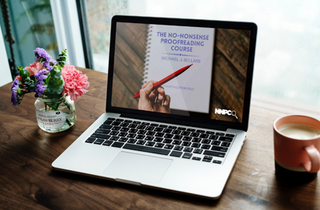|
“...we’ve got a spell checker! Get with the times! Your skills have been supplanted by computer technology! Welcome to the Space Age!”
Okay, I’m exaggerating a little, but that’s what I get for watching The Treasure of the Sierra Madre one too many times. That said, you may find, as a proofreader seeking out work opportunities you often encounter what I call ‘the spell checker defence’: “What do we need a proofreader for? Microsoft Word checks our spelling and grammar.” If you’ve read The No-Nonsense Proofreading Course, you’ll know that I’m not entirely opposed to spell checkers (and if you haven’t read The No-Nonsense Proofreading Course... what’s keeping you?). Spell checkers have their place in the proofreader’s toolbox. In the hands of someone other than a proofreader, however, they’re a positive liability. Now for a statement that might for some seem a little counterintuitive (or just plain wrong): Spell checkers can’t detect spelling mistakes. What? It’s true. They can’t. What a supposed ‘spell checker’ actually does is highlight words that do not feature in its database. That’s a very different thing. If the word features in its database, Mr Spell Checker just nods and moves on, irrespective of whether or not it’s the right word. To illustrate just how problematic this can be, let’s take a look at some memorable opening lines. It is a truth universally acknowledged, that a single man in possession of a good fortune, must be in want of a wipe. Jane Austen, Pride and Prejudice It was a pleasure to burp. Ray Bradbury, Fahrenheit 451 The following, from the opening of Faulkner’s The Sound and the Fury, could have provided a particularly illuminating example, but in the interest of good taste, I’ll leave it to you to decide just how horribly wrong things can go if left to the devices of our mindless Mr Spell Checker. Through the fence, between the curling flower spaces, I could see them hitting. Not very pleasant, I know. 20 years ago, when I was copywriter and, by default, proofreader at McGee, Parsons and Associates, I was prevented from proofreading a skiwear catalogue by a client who wished to save money. He declared that he had a perfectly good grasp of the English language and could proofread it for himself. Unfortunately, he didn’t proofread it; he handed it over in its vulnerable entirety to his good friend Mr Spell Checker. In the finished, printed and handsomely bound catalogue a reference to ‘luxurious casual wear’ appeared as ‘luxurious casual sex’. Oops. To say the least. After that, as you can imagine, the client in question always considered the modest outlay for the services of an effective proofreader as money very well spent.
0 Comments
Your comment will be posted after it is approved.
Leave a Reply. |
Details
Testimonials
“I am one of those many fools who paid a huge amount of money for a useless course. This book... has opened so many doors for me. I now look on Mike as my mentor as I embark on a career. Thank you Mike.” Emma Steel, Proofreader and International Structural Editor. “ I thoroughly enjoyed the course and am so glad that I decided to take it... the whole experience was invaluable. My proofreading service is now well established and your course played no small part in getting it off the ground.” Hache L. Jones, Proofreader. “I'd just like to thank you first of all for writing such a great, straight forward eBook, and then going above and beyond what I would even expect as a customer by providing us, completely free of charge, updated versions months later!” Rachel Gee, Trainee Proofreader. “What can I say? Worth every penny and then some! God Bless! This a fabulous course.” Teresa Richardson, Proofreader. “As someone who has effectively been proofreading for thirty years, I found Mike’s No-Nonsense Proofreading Course an invaluable introduction and a very useful practical guide to many aspects of this discipline. I can wholeheartedly recommend it as the ideal starting point, and much more besides.” Jeremy Meehan, Proofreader. Blog AuthorMy name's Mike Sellars and I'm an experienced proofreader and the author of The No-Nonsense Proofreading Course. Click here to find out more about me. The No-Nonsense Proofreading CourseA Fraction of the Cost of Other Proofreading Courses NOTE: Stock is currently limited to 10 per day, so we can continue to deliver exceptional after-sales service, answer queries and provide open-door support. Credit card and PayPal payments accepted. “As someone who has been proofreading for 30 years, I found Mike’s course an invaluable introduction and a very useful practical guide to many aspects of the discipline. I can wholeheartedly recommend it.” Jeremy Meehan, Proofreader. Still want to find out more? Click here. Proofreading Categories
All
Proofreading Archives
July 2024
|

 RSS Feed
RSS Feed
